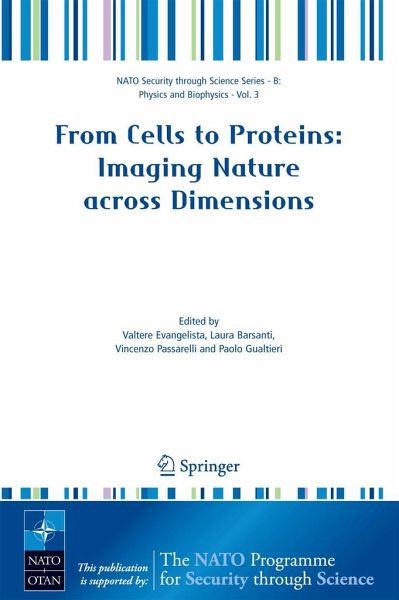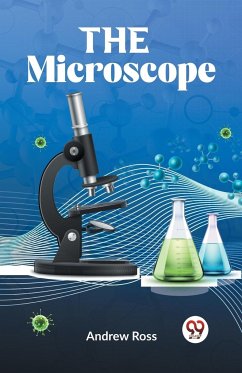
From Cells to Proteins: Imaging Nature Across Dimensions
Proceedings of the NATO Advanced Study Institute, Held in Pisa, Italy, 12-23 September 2004
Herausgeber: Barsanti, Laura, Gualtieri, Paolo, Passarelli, Vincenzo, Evangelista, Valtere
Versandkostenfrei!
Versandfertig in über 4 Wochen
308,99 €
inkl. MwSt.

PAYBACK Punkte
154 °P sammeln!
How deep we can see inside Nature's smallest secrets? Will it be possible some day in the near future to investigate living structures at atomic level? This area of study is very interdisciplinary, since it applies the principles and the techniques of biology, physics, chemistry, mathematics, and engineering to elucidate the structures of biological macromolecules, of supramolecular structures, organelles, and cells. This book offers updated information on how much information we are able to obtain in the exploration of the inner details of biological specimens in their native structure and co...
How deep we can see inside Nature's smallest secrets? Will it be possible some day in the near future to investigate living structures at atomic level? This area of study is very interdisciplinary, since it applies the principles and the techniques of biology, physics, chemistry, mathematics, and engineering to elucidate the structures of biological macromolecules, of supramolecular structures, organelles, and cells. This book offers updated information on how much information we are able to obtain in the exploration of the inner details of biological specimens in their native structure and composition.
The book deals with the implementation of laser beam and stage scanning systems incorporating confocal optics or multiphoton microscopy; the advent of new electro-optical detectors with great sensitivity, linearity, and dynamic range; the possibility of 2D fast image enhancement, reconstruction, restoration, analysis and 3D display, and the application of luminescence techniques (FLIMT, FRET combined with the use of quantum dots), which gives the possibility to investigate the chemical and molecular spatio-temporal organization of life processes; Electron Microscopy and Scanning Force Microscopy (SFM), are also presented, which has opened completely new perspectives for analyzing the surface topography of biological matter in its aqueous environment at a resolution comparable to that achieved by EM.
The book deals with the implementation of laser beam and stage scanning systems incorporating confocal optics or multiphoton microscopy; the advent of new electro-optical detectors with great sensitivity, linearity, and dynamic range; the possibility of 2D fast image enhancement, reconstruction, restoration, analysis and 3D display, and the application of luminescence techniques (FLIMT, FRET combined with the use of quantum dots), which gives the possibility to investigate the chemical and molecular spatio-temporal organization of life processes; Electron Microscopy and Scanning Force Microscopy (SFM), are also presented, which has opened completely new perspectives for analyzing the surface topography of biological matter in its aqueous environment at a resolution comparable to that achieved by EM.














